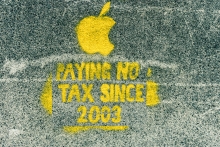EU Apple Tax Ruling shows austerity is a political decision, says Pavanelli
31 August 2016

“This ruling shows that governments do have access to the funds to provide public services such as Health, Education and Water if they have the political will”, sustains Pavanelli, who also notes that the amount Apple is being asked to pay is the equivalent of a year’s Health budget for Ireland.
Apple claims that it has followed the law, but the point is that the laws have been altered to suit Apple.
“This is the worst form of corruption and should be considered an international crime. My first thought is for the Irish workers and families who have suffered for the austerity measures imposed by the Irish government to recover from the financial crisis. While the government is politically responsible, Apple should be held socially and morally responsible for that suffering”, says the PSI General Secretary.
The scandal is that politicians have changed the laws to allow so much money to escape the tax net when ordinary people are being asked to pay more in consumption taxes and wages taxes and to accept cuts in public services - while the largest corporations on earth stash billions with the complicity of elected politicians.
“It is incredible that a company paying as little as 0.005% tax is upset that it should have to pay more. It shows how badly wrong the global tax rules are when national politicians defend these practices”, continues Pavanelli.
Apples tax dodging highlights the way countries are competing with each other in a dangerous race to the bottom. Ireland already has a very low corporate tax rate of 12.5%, but has reached the illegal agreements with Google that drops that rate much lower.
Responding to claims from Apple's CEO, Tim Cook, that forcing Apple to pay its fair share of tax would hurt investment and jobs, Pavanelli reminds that if companies like Apple paid more taxes, jobs could be created in cash-starved public Health, Education and Water.
Responding to claims from Apple's CEO, Tim Cook, that forcing Apple to pay its fair share of tax would hurt investment and jobs, Pavanelli reminds that if companies like Apple paid more taxes, jobs could be created in cash-starved public Health, Education and Water.
"Analysts estimate that Apple has US$ 216 billion in cash reserves – this money creates no jobs - but paying the €13 billion could create thousands of decent jobs that help real people.”
McDonald's
The EU and other governments have only been taking notice of tax in the last few years because of the hard political work of unions such as PSI and a wide range of partners. A coalition of unions including EFFAT, PSI, SEIU and EPSU have been pursuing McDonalds for its aggressive tax schemes and last year the EC agreed to begin an investigation. The Apple outcome indicates that the EC is going to take the McDonalds investigation seriously.
The EU and other governments have only been taking notice of tax in the last few years because of the hard political work of unions such as PSI and a wide range of partners. A coalition of unions including EFFAT, PSI, SEIU and EPSU have been pursuing McDonalds for its aggressive tax schemes and last year the EC agreed to begin an investigation. The Apple outcome indicates that the EC is going to take the McDonalds investigation seriously.
“Our task is to create the political pressure to force politicians to investigate these very powerful companies. With rising inequality and cuts to public services tax is an issue for all workers. But we will only win if we dare to fight. There is no excuse for privatisation of public services while governments are not collecting corporate tax and defending a set of global tax rules that facilitate aggressive tax planning”, concludes Pavanelli.

